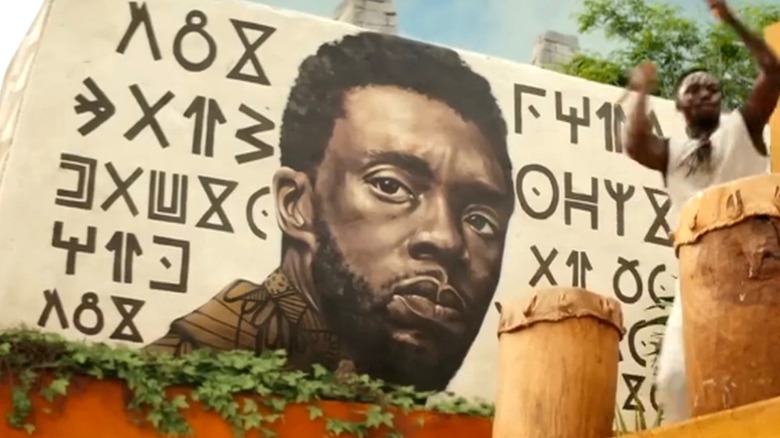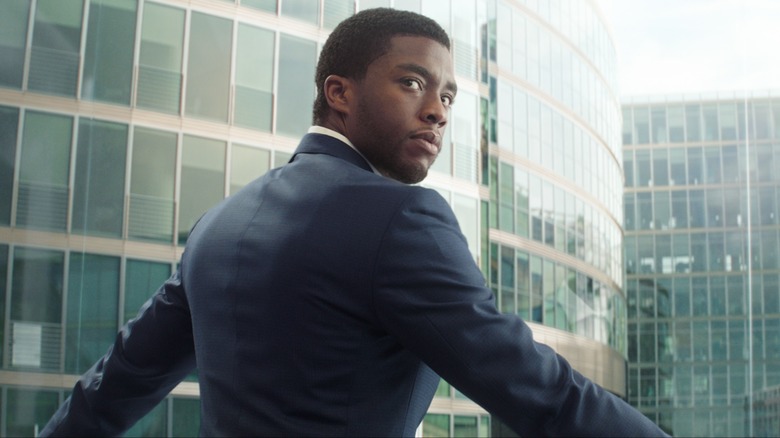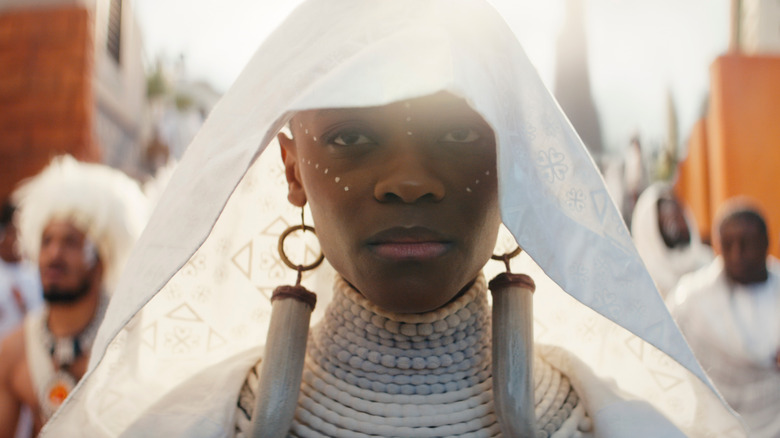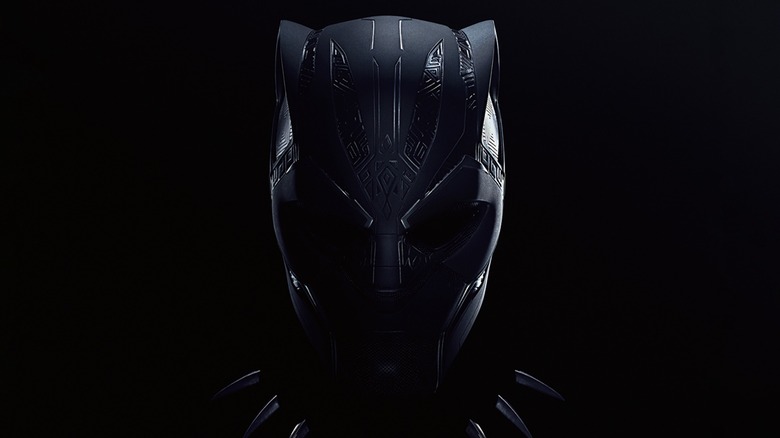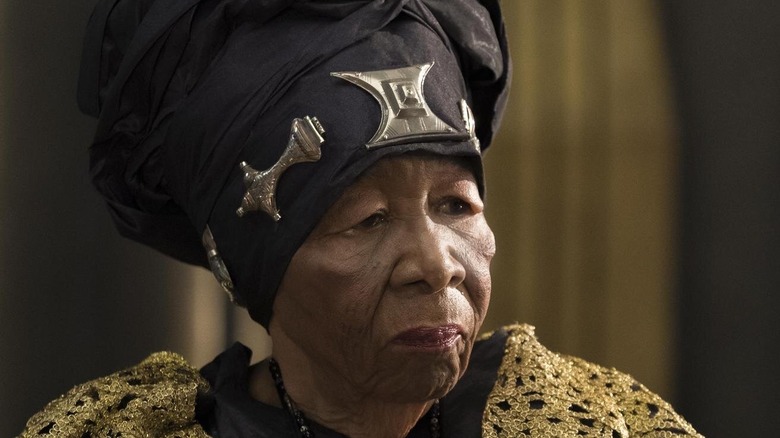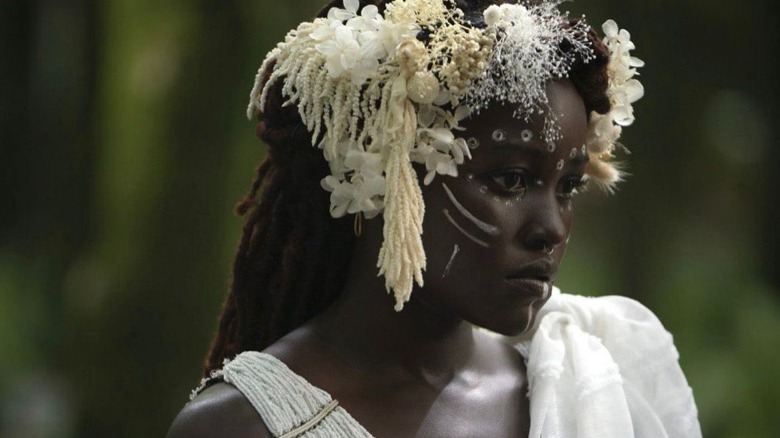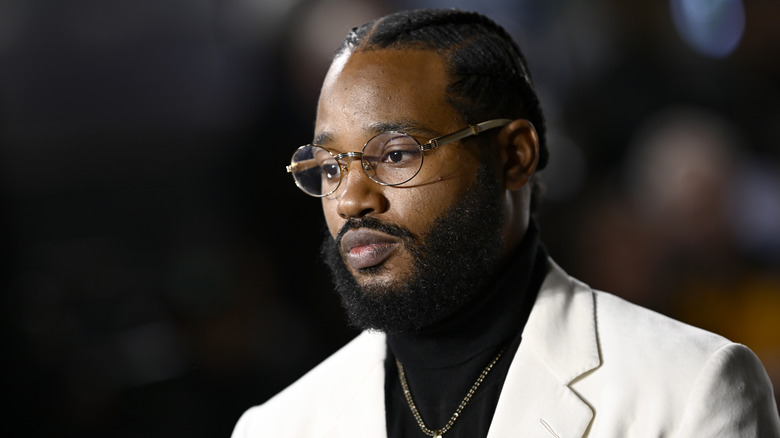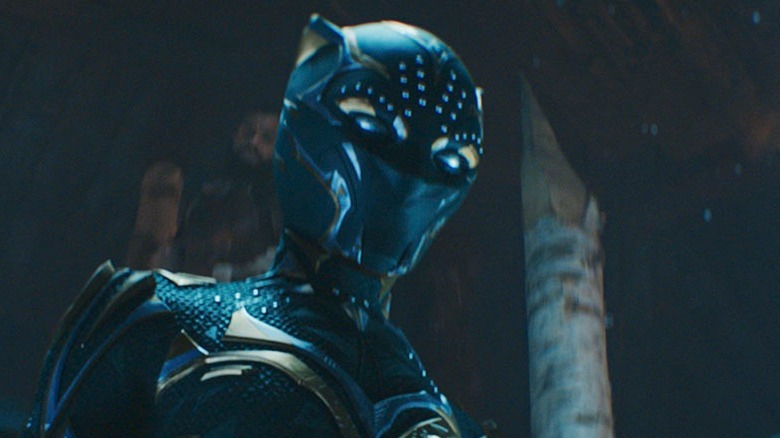Everything That Went Wrong During The Making Of Black Panther: Wakanda Forever
Any Hollywood worker worth their weight in Moviola machines will tell you that filmmaking is an incredibly difficult process, no matter the scale. Classics like "Jaws," "Apocalypse Now," and the original "Star Wars" were famously forged in the fires of production hell, emerging as trend-setting titans only after arduous physical and emotional hardships. This holds true for the Marvel Cinematic Universe, too. Given how saturated we are with Marvel media, it can be easy to ignore the blood, sweat, and tears poured into each and every production by the biggest name in superhero media.
The latest entry in Marvel's mega-franchise, "Black Panther: Wakanda Forever," is the endpoint of what is, without question, the most exhausting journey any MCU project has ever taken. From the death of its star to copious delays to the new obstacles of a COVID-ravaged world, no Marvel Studios production has ever seen such a perfect storm of problems come together; in a way, that's a fitting fate for a movie featuring a nation of sea-dwellers. The following eight events tell the complete behind-the-scenes story of 2022's most anticipated superhero movie, Wakandan warts and all.
The death of Chadwick Boseman
"Black Panther: Wakanda Forever" is ultimately about the loss of a beloved figure and the resulting emotional fallout, both in front of the camera and behind the scenes. Chadwick Boseman's death on August 28, 2020 was a tremendous shock to both the American film industry as well as movie-going audiences worldwide. At only 43 years old, and at the top of the Hollywood food chain thanks to his performance as King T'Challa, a life well-lived and a career on the rise were both grimly cut short.
Boseman's passing was uniquely devastating. The actor remained extremely private about his condition to everyone outside his immediate family up until his death. Even key colleagues, like "Black Panther" director Ryan Coogler, were kept in the dark. By August 2020, Coogler and co-writer Joe Robert Cole had already drafted a screenplay for what was then simply "Black Panther II," with a story centered on T'Challa in a post-Blip Wakanda. Obviously, rewriting the sequel to a superhero movie was the least of Coogler and Cole's concerns on that August day, but the two were in an unenviable position nonetheless. Marvel Studios has always prided itself on the strength of its characters and its casting, but now one of its most important actors was gone.
The rise of COVID-19
Though it's the reason least specific to "Wakanda Forever," it will forever be impossible to discuss the production of any major media from the early 2020's without mentioning the COVID-19 pandemic. It is the pretext to almost every recent major world event, and its impact on the global entertainment industry is so vast it literally cannot be measured without years of distance.
Like every Marvel Studios project set for release in 2020 and onward, "Wakanda Forever" saw multiple delays in the wake of the pandemic. Chadwick Boseman's death had already pushed filming back but now the entire MCU was on pause as the world masked up and buckled down. Weeks turned into months, and just when it seemed "Wakanda Forever" would finally arrive in Summer 2022, it was pushed back one more time to the end of that year. Delays do not always foretell a cinematic disaster, especially when the delays are a direct result of a pandemic instead of poor management or creative differences (with apologies to "Blade"). But these delays would nonetheless create a gap between "Black Panther" films that would last just under five years – one of the longest in the MCU.
The downward spiral of Letitia Wright
The pandemic was a "mask off" moment for a lot of public figures in more ways than one, especially as the developing COVID-19 vaccine became available for mass distribution in 2021. Of the many celebrities who voiced their opinion of the vaccine, none had poorer timing than "Wakanda Forever" star Letitia Wright. Not long after sustaining multiple injuries on-set, leading to a production delay, The Hollywood Reporter reported that Wright was allegedly propagating anti-vaccine and anti-science sentiments on set. Wright denied the allegations immediately, but it was too late.
Though she's certainly no Ezra Miller, Wright has a reputation for overzealous anti-science sentiment thanks to her social media accounts, making these reports easy to believe. Given Wright's importance to the MCU, the notion that Marvel's most culturally significant franchise might be led by an anti-vaxxer did not sit well with many fans.
The demand to #RecastTchalla
During a Disney Investor Day presentation in December 2020, Marvel Studios CEO Kevin Feige formally announced that, in honor of Chadwick Boseman, Marvel would not recast King T'Challa. Though the decision wasn't totally surprising, the negative response to that choice was unusually strong; fans of Black Panther wanted to see their favorite character continue his live-action adventures. Even Derrick Boseman, Chadwick's brother, told TMZ that he believed that his sibling would've preferred the character to live on. Ever since, "#RecastTchalla" has been an alarmingly consistent trending topic on Twitter.
It's not difficult to see why. Still, given the tragic circumstances, the hostility came off as wildly insensitive. The heated discourse didn't help anything or anyone, and only generated doubt about the ongoing production. Unfortunately, the "#RecastTchalla" campaign would end up being the least of Marvel's concerns with "Wakanda Forever."
The death of Dorothy Steel
As previously mentioned, "Wakanda Forever" is a tribute to Chadwick Boseman and a celebration of his life. However, Boseman is not the only member of the original "Black Panther" cast who died during its sequel's elongated production. In October 2021, actress Dorothy Steel, who played one of the elder tribe leaders in the original film, died at 95. Remarkably, Steel began her Hollywood career at the inspiring age of 88; she was contacted by Marvel Studios' casting directors just one hour after she sent in her "Black Panther" audition tape.
To some, the death of a supporting actor in her mid-90s may not seem too significant. However, the timing of Steel's departure was, unfortunately, par for the course on the "Black Panther" sequel. Steel was in the middle of reprising her role for "Wakanda Forever" when her physical health gave out; she was flown back to her home in Detroit, Michigan and spent her last days with her loved ones. Losing an actor in the middle of a production is always tragic, but given the circumstances, this death was particularly notable. For the cast and crew of "Wakanda Forever," it was yet another spell of rain on a sea of grief.
The surge of the Omicron variant
"Wakanda Forever" could not escape the Omicron variant as it wrought havoc across the greater entertainment industry during the 2021 holiday season (although it sure didn't stop audiences from seeing the latest Marvel flick, "Spider-Man: No Way Home"). A few weeks into 2022, "Wakanda Forever" star Lupita Nyong'o and some other crew members tested positive for the coronavirus variant, forcing production to shut down once again.
Even though the actual delay lasted only a week, it was deeply frustrating to see "Wakanda Forever" held back by factors (mostly) outside of the cast and crew's control. For MCU die-hards, it also served as a bad case of confirmation bias, validating fears and suspicions that the film was somehow cursed. In a way, it was almost poetic: Would "Wakanda Forever" stay in production ... forever?
The police detain Ryan Coogler
By the end of 2021, faith in the "Black Panther" follow-up had reached an all-time low, at least among fans. With only a few set photos available and a steady stream of confidence-busting headlines, it was beginning to feel like continuing the "Black Panther" franchise after the loss of its star was the wrong call. It was at this low point that the unthinkable happened: Somehow, things got even worse.
Seven days into 2022, while filming at Marvel Studios' stomping grounds in Atlanta, Georgia, Ryan Coogler was detained by police at a bank while attempting to withdraw money from his account; the bank teller serving Coogler mistook the filmmaker for a robber, and promptly called 911. The police arrived and handcuffed Coogler and two of his colleagues, who were held in a police car until the director verified his identity. Though this wasn't directly related to the movie's production, the widely-publicized arrest only created further concern about the film's long-term prospects.
The debut of the Wakanda Forever trailer
It's amazing what a good first impression can do. Even with an unjust arrest, a stunt-related injury, and numerous COVID-19 complications in its history, all the problems stopped mattering when "Black Panther: Wakanda Forever” footage closed out the Marvel Studios panel at Comic-Con International 2022. Hall H attendees (and the rest of the planet) were treated to a moving, powerful trailer featuring expert editing, stunning imagery, and the introduction of Tenoch Huerta's Mesoamerican-inspired Namor the Sub-Mariner, one of Marvel Comics' oldest (and, originally, whitest) creations.
During that same panel, Kevin Feige revealed that "Wakanda Forever" would also serve as the conclusion of the MCU's "Phase Four" lineup, a distinction normally reserved for "Avengers" films. It was a major honor for the most troubled project the MCU has ever seen. Just when Marvel fans were starting to break out in a cold sweat every time that "Wakanda Forever" appeared in a headline, Ryan Coogler and company parted the clouds — or, more appropriately, the seas — and proudly marched forward towards the film's November 11th release date.
